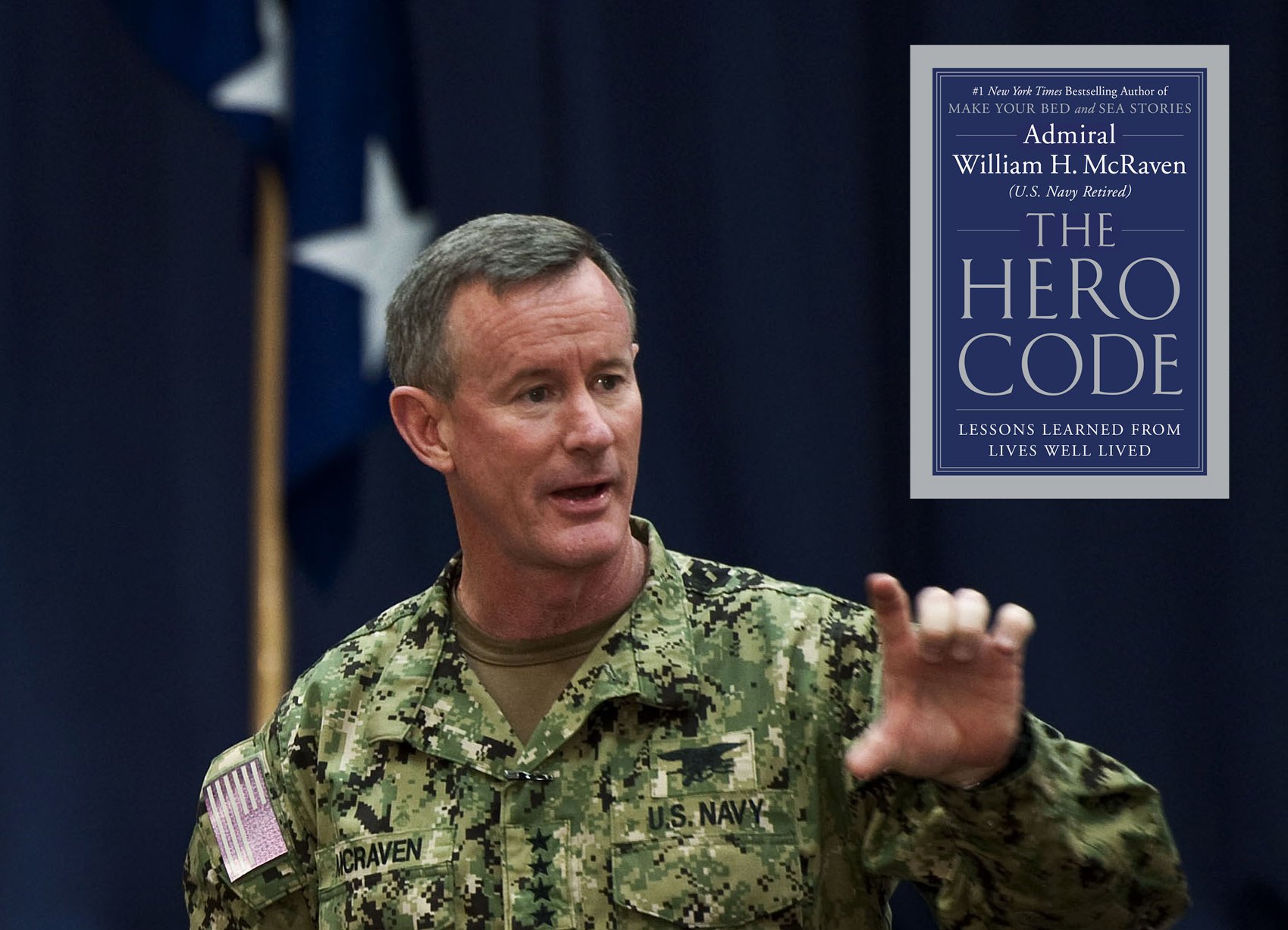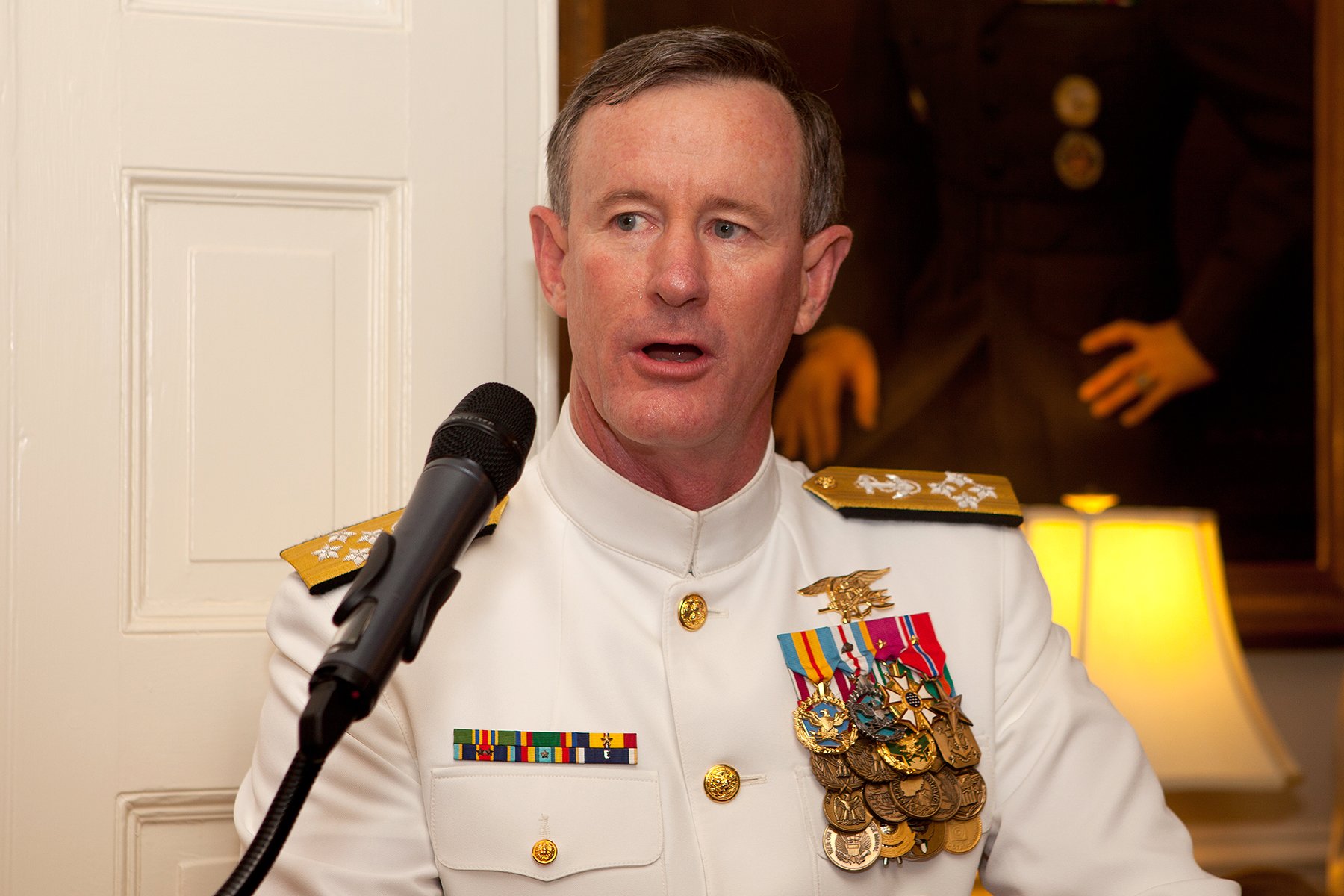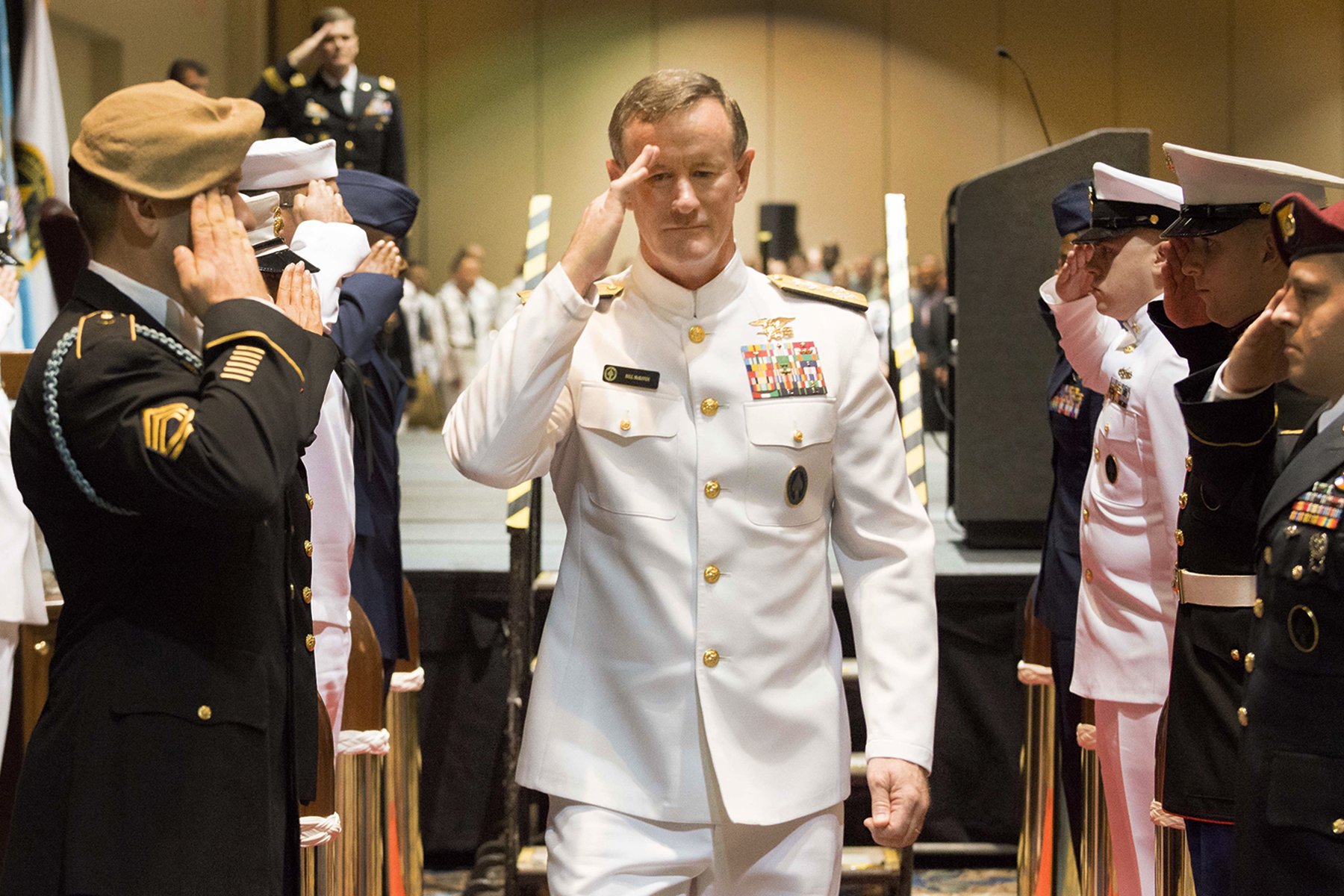Admiral Who Oversaw Bin Laden Raid Explores the ‘Hero Code’ in New Book

US Navy Adm. William McRaven, commander of the US Special Operations Command, speaks to special operations commanders during a commander’s call at King Auditorium on Hurlburt Field, Fla., Jan. 30, 2012. US Air Force photo by Airman 1st Class Christopher Williams, released.
Hope springs incessantly in William H. McRaven’s second self-help book, The Hero Code: Lessons Learned From Lives Well Lived.
As commander of the Joint Special Operations Command in 2011, the now-retired admiral and Navy SEAL commander oversaw the raid that killed Usama Bin Laden. In his 37-year career in uniform, McRaven saw “the worst of humanity” and “the best of mankind,” and The Hero Code focuses on the latter.
“There is a hero in all of us,” McRaven writes. He believes there is a moral code “written in our DNA” that “drives the human race to explore, to nurture, to comfort, to inspire, and to laugh so that societies can flourish.”
Most of us, he says, “must learn how to bring forth these virtues.” His book, which can be read from start to finish in 45 minutes, has the admirable goal of motivating the reader to learn how, with examples of heroes from the well known to the relatively unknown, each pulled from McRaven’s experiences.
“Courage is not the sole purview of warriors,” he writes, but the reader could easily perceive differently when nine of 10 chapters focus on military figures or settings.

Many would agree that examples such as the late Navy aviator, Sen. John McCain; Marine Pfc. Ralph Johnson, who posthumously received the Medal of Honor for his action in Vietnam; and Lt. Ashley White, a Cultural Support Team member killed in Afghanistan and the subject of the powerful book Ashley’s War (2015), demonstrated traits worthy of emulation.
Even so, McRaven’s premise might be more persuasive if the book offered a balance of inspiration from civilians besides the actor and service-member supporter Gary Sinise, physician Michael Keating, and scientist Jim Allison (who discovered a cancer-fighting drug).
Each of McRaven’s persons of character personifies one of the simple traits the author suggests acquiring on the highway to heroism: courage, humility, sacrifice, integrity (“honesty is the cornerstone”), compassion, perseverance, duty, hope, humor, and forgiveness.
He begins each chapter with a quotation — starting with one from Anne Frank and ending with one from Mahatma Gandhi — then personalizes each concept, closing with a motivational mantra.

In the chapter “Hope,” for example, McRaven advises the reader to use his or her “unique talents to inspire others and give them hope that tomorrow will be a better day.” “Hope” is the most personal chapter in the book, describing what happened when McRaven learned he had chronic lymphocytic leukemia, or CLL.
He saw “the world’s foremost expert” on CCL, Jim Allison, and the doctor emboldened McRaven to not think about “what might be” but to instead focus on reality — on “what is.”
Such recommendations could give some readers a sense that The Hero Code is aspiration in Diet Code form, and cynics might tire of truisms such as “never fear the path that is rocky, steep and treacherous.”
Others will appreciate the inspiring stories and find that McRaven’s counsel provides comfort and promotes altruism. Not surprisingly, his fans are many. The author’s first self-help venture, Make Your Bed: Little Things That Can Change Your Life … and Maybe the World (2017) is the 144-page outgrowth of his 2014 commencement address at the University of Texas in Austin.
McRaven also produced a fill-in-the-blank Make Your Bed diary, and in September, look for the children’s version of the book featuring Skipper the seal. Each is evidence that the once-secretive, lips-sealed SEALs continue to open up for publication, and McRaven’s uplifting output places him firmly in the cottage-by-the-SEAL-sea industry.
In the chapter about humor, McRaven makes the case that even the arduous Basic Underwater Demolition/SEAL training can be fun, especially when you get the last laugh. (He does.)
In a touching recollection from Afghanistan, McRaven finds forgiveness from the father of three children who had been killed by US soldiers in “the most gut-wrenching tragedy I had faced.” Forgiveness, he says, “can rid you of the hatred that is the demise of so many good men and women.”
In the epilogue, McRaven reminds readers there is no real action hero, no Superman, who will save the world.
“It is up to us,” he says.
The Hero Code: Lessons Learned From Lives Well Lived by William H. McRaven, Grand Central Publishing, 176 pages, $22
Read Next: Must Watch: Army Ranger’s Visual-Poem Ode to Wounded Warriors Is Incredible

J. Ford Huffman has reviewed 400-plus books published during the Iraq and Afghanistan war era, mainly for Military Times, and he received the Military Reporters and Editors (MRE) 2018 award for commentary. He co-edited Marine Corps University Press’ The End of Don’t Ask, Don’t Tell (2012). When he is not reading a book or editing words or art, he is usually running, albeit slowly. So far: 48 marathons, including 15 Marine Corps races. Not that he keeps count. Huffman serves on the board of Student Veterans of America and the artist council of Armed Services Arts Partnership and has co-edited two ASAP anthologies. As a content and visual editor, he has advised newsrooms from Defense News to Dubai to Delhi and back.
BRCC and Bad Moon Print Press team up for an exclusive, limited-edition T-shirt design!
BRCC partners with Team Room Design for an exclusive T-shirt release!
Thirty Seconds Out has partnered with BRCC for an exclusive shirt design invoking the God of Winter.
Lucas O'Hara of Grizzly Forge has teamed up with BRCC for a badass, exclusive Shirt Club T-shirt design featuring his most popular knife and tiomahawk.
Coffee or Die sits down with one of the graphic designers behind Black Rifle Coffee's signature look and vibe.
Biden will award the Medal of Honor to a Vietnam War Army helicopter pilot who risked his life to save a reconnaissance team from almost certain death.
Ever wonder how much Jack Mandaville would f*ck sh*t up if he went back in time? The American Revolution didn't even see him coming.
A nearly 200-year-old West Point time capsule that at first appeared to yield little more than dust contains hidden treasure, the US Military Academy said.












